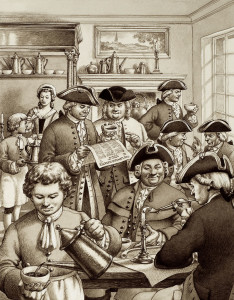‘Strong coffee, in the proportion of an ounce and a half to a pint, and particularly when made by infusion, is not only truly grateful to the palette, but wonderfully fortifies and strengthens the stomach, as well as the whole nervous system. It adds, maintains one of its warmest panegyrists, or gives spirits to the body, on any sinking, faintness, weakness, or weariness, of mind or body, and that beyond whatever the best wine can effect; conveying, as it were, life and strength to the whole frame. It is, doubtless, very good against consumptions, vapours and hysterics, and all cold and moist diseases afflicting the head, brain etc; it prevails also, on being long and plentifully used, against the scurvy, dropsy, and gout , as well as all manner of rheumatic pains ; absorbing all acidities in the human body, and destroying the congelative powers by which those diseases are chiefly generated; while, by it’s(sic) diuretic property, it carries off all those heterogene and morbific humours, after a very singular manner. “
It may be, says Salmon, the medical writer here in part quoted, “that I have said a great deal in commendation of this strong coffee, but I can truly assert that I have said nothing but what I know myself, and that in my own person, to be truth, and have had confirmed by manifold and daily experiences for a great many years, to my exceeding satisfaction. I was also cured, about ten years since, of a rheumatic pain in my shoulder; which was so vehement that, besides the perpetual pain, I could not as much lift my arm or hand up to my head, not put it behind my back , for nearly two years , in which I received no benefit by a long application of vesicatories, and continual use of opiates. Of this vehement rheumatism, I was perfectly cured by drinking a full quart of strong coffee at a time, and continuing it some days together, nor have I since the smallest return. The like relation I have had from two other persons, particular patients of mine, who were much more grievously afflicted, by their own accounts, than even I was; who by an extravagant drinking of strong coffee, to use their own words, were perfectly cured, and freed from their deplorable lameness, after manifold applications, and the use of many other things, both external and internal, had for some years past been tried in vain.”
It may seem difficult to add to this long list of the medical virtues of strong coffee; we have, however, considerably abridged the detail, which describes it as very little short of a universal medicine. The zeal of our old friend Salmon may have transported him somewhat too far; but we see no good reason for doubting the truth of his alledged experiences, not having the smallest dread of any ill consequences from a free use of this salutary liquid. Even modern physicians have admitted , that in cases of spasmodic asthma, scrophula, diarrhoea, agues, and particularly against narcotic poisons, such as opium, hemlock &c, coffee often produces the best effects; nor is there, a very recent author asserts, a domestic remedy better adapted to relieve periodical headaches, which proceed from debility or want of tone in the stomach. This character, too, is given, as it should seem, without insisting on the particular strength of the coffee, on which Salmon alone depends.
The same book also recommends methods in which coffee may be brewed to produce the best results. A contemporary writer, the famous Dr Kitchener, in his Cook’s Oracle (1823 edition), agrees that only coffee made in a certain way will be worth drinking. He suggests the use of a ‘German filter‘ and recommends that connoisseurs of the beverage pay at least 4/- a pound –whether for whole beans or ground, we don’t know. What Kitchener doesn’t do is to wholly support the astonishing medical claims for coffee that Salmon, a fellow physician, makes. He is content to merely state that ‘ coffee, as used on the Continent, serves the double purpose of an agreeable tonic, and an exhilarating beverage, without the unpleasant effects of wine’. He contrasts this strong coffee with the weak version made in England, which ‘debilitates the stomach and produces a slight nausea’.
So, it would seem, only ‘ strong ‘ coffee had the medical virtues described by Salmon and partially endorsed by Kitchener.
[R.M.Healey]
* (c/o Look and Learn)

